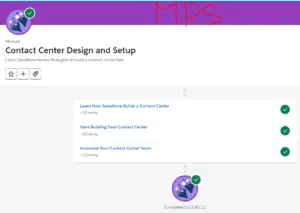In this tutorial, we are going to cover the Module called “Contact Center Design and Setup“. In this lecture, you are going to learn Salesforce-tested strategies to build a contact center fast. Click here to solve the quiz Contact Center Design and Setup on the trailhead.
#1. Learn How Salesforce Builds a Contact Center
Solve these tests and get 100 points
Qn1. How do Einstein Bots and Messaging work together to deliver a better customer experience?
I)By using natural language processing to build custom applications
II)By gathering information from customers before agents begin a chat or a voice call
III)By enabling faster case resolution
IV)B and C
Answer: IV)B and C
Qn2. What’s one way a modern contact center can meet customer expectations?
I)Enable customers to chat with agents via SMS.
II)Hire agents with lots of experience.
III)Let angry customers speak directly with your vice president or CEO.
IV)Tell customers live chat yields the best results.
Answer: I)Enable customers to chat with agents via SMS.
Check the Quiz to Earn 100 out of 100 Points
The second attempt earns 50 points. Three or more earn 25 points.
#2. Start Building Your Contact Center
Solve these tests and get 100 points
Qn1. If you’re trying to build a knowledge base quickly, where should you start?
I)Begin by repurposing a list of frequently asked questions.
II)Recruit tech-savvy researchers to help.
III)Crowdsource questions from customers on social media.
IV)A and C
Answer: I)Begin by repurposing a list of frequently asked questions.
Qn2. Why is it important to test your contact center before it launches?
I)To ensure a smooth transition for your workforce to their new office space
II)To verify that the setup of your tech works the way you want before you go live
III)So you have better input metrics.
IV)A and B
Answer: IV)A and B
Check the Quiz to Earn 100 out of 100 Points
The second attempt earns 50 points. Three or more earn 25 points.
#3. Assemble Your Contact Center Team
Solve these tests and get 100 points
Qn1. Why do you need to consider the physical security of your contact center?
I)To make sure third parties can’t access customer information while in the contact center
II)To train employees how to avoid phishing scams
III)To make sure agents have total privacy when talking to customers
IV)A and C
Answer: I)To make sure third parties can’t access customer information while in the contact center
Qn2. What are fluid service agents?
I)Agents who have flexible schedules
II)Agents who have fresh ideas
III)Agents who can work in every channel with ease
IV)Agents who can multi-task
Answer: III)Agents who can work in every channel with ease
Check the Quiz to Earn 100 out of 100 Points
The second attempt earns 50 points. Three or more earn 25 points
1. Introduction to Contact Centers
A contact center serves as a central hub for managing customer interactions across various channels, such as phone, email, chat, and social media. It is essential for businesses to provide exceptional customer service and support, as it directly impacts customer satisfaction and loyalty. A well-designed contact center ensures efficient communication, timely issue resolution, and personalized experiences for customers.
2. Salesforce for Contact Centers
Salesforce offers Service Cloud, a comprehensive customer service platform, specifically designed to enhance contact center operations. Service Cloud provides a unified view of customer data, case management capabilities, automation tools, and integration options, empowering agents to deliver exceptional service. It enables businesses to handle customer inquiries efficiently, optimize agent productivity, and drive customer satisfaction.
3. Key Components of a Contact Center
A contact center comprises several key components that work together to deliver a seamless customer experience. These components include:
- Channels: Various communication channels, such as phone, email, chat, social media, and self-service portals, through which customers can interact with the contact center.
- Routing: Intelligent routing mechanisms that direct customer inquiries to the most appropriate agents or teams based on skills, availability, or predefined rules.
- Knowledge Management: A centralized knowledge base that provides agents with access to relevant information, troubleshooting guides, and best practices to address customer queries.
- Case Management: A system to manage and track customer cases or tickets from initial contact to resolution, ensuring efficient and timely issue resolution.
- Reporting and Analytics: Tools to monitor contact center performance, track key metrics, and gain insights into customer interactions and agent productivity.
4. Designing the Contact Center Architecture
Designing an effective contact center architecture involves understanding your business requirements, customer needs, and available resources. Consider factors such as the volume of interactions, channel preferences of your customers, scalability requirements, and integration capabilities with existing systems. Collaborate with stakeholders, including IT, customer service, and contact center managers, to define the architecture that aligns with your organizational goals.
5. Configuring Salesforce Service Cloud
Salesforce Service Cloud serves as the foundation for your contact center setup. Configure Service Cloud by defining key objects such as Accounts, Contacts, Cases, and Products. Customize page layouts, fields, and workflows to match your specific contact center processes. Leverage Salesforce’s declarative tools, such as Lightning App Builder and Process Builder, to create a tailored user interface and automate routine tasks.
